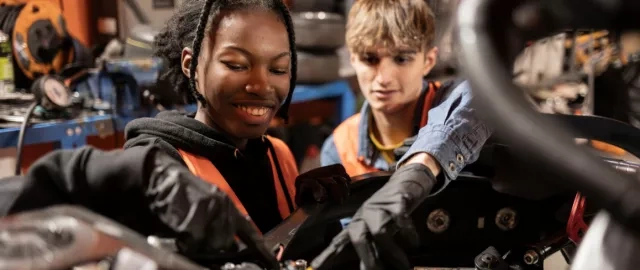Automotive risks being left behind in the talent race

New IMI analysis: Limited progress in diverse recruitment and employment policies and lack of government support threaten the sector’s future
The latest analysis of workforce data from the Institute of the Motor Industry (IMI) underlines the stark labour market pressures facing the automotive sector. With an ageing workforce profile and only marginal improvements in diversity, the sector’s ability to attract new talent is being seriously undermined. Yet it is critical to the UK economy and must play a vital role in the government achieving its net zero targets.
Key data points:
- Over 47% of the automotive workforce is aged 45+
- Women comprise just 18.6% of the workforce (50% nationally), although there has been a marginal 1.1% increase year-on-year
- Only 10.4% of senior roles are held by women – and over the past three years, female representation in senior automotive roles has declined by 12.3%
- Disabled workers represent 16.2% of the workforce – a 2.5% increase over the previous 3 years
- Just 9.8% of disabled workers are in senior roles
- Representation of non-White British workers in the automotive workforce has increased from 12.5% to 19.9% year-on-year – a 7.4 percentage point rise
- But only 11.6% of non-White British workers are in senior roles
“UK automotive cannot afford to lose in the race for talent, yet right now not enough is being done to future-proof the sector,” said Nick Connor, CEO of the IMI. “While some progress has been made in recent years, with an increase being seen in the number of women, non-White British and disabled workers entering the sector, the time is now to do everything possible to attract new, young talent.”
“The IMI is championing a more inclusive future through initiatives like our ‘More to Motor’ campaign and partnerships aligned to the Gatsby Benchmarks, as well as working with industry bodies like the Automotive 30% Club, of which we are a Gold Partner. We’re also using our voice to influence policy, including our submission to the Government’s Parental Leave and Pay Review, to help remove structural barriers that limit women’s participation and progression in their careers.”
“But we also need employers to step up. Our data shows that diverse automotive businesses outperform their peers by 25% so it’s hard to understand why we are still seeing such small improvements across the sector.”
“It is also critical that government recognises the fundamental role of automotive to the UK economy. Without reforms to skills funding, Industrial Strategy investment, and the national recognition of competence standards such as IMI TechSafe, workforce diversity and skills development risks will
continue to undermine the sector, despite government expecting it to deliver on net zero targets.”
The UK automotive sector employs approximately 760,000 people, accounts for 2.3% of all UK jobs and contributes over £37 billion to the UK economy. As the voice of the automotive workforce, the IMI is urging employers to prioritise inclusive recruitment, particularly in technical and leadership-track roles as well as develop retention and progression pathways for under-represented groups.
Government funding for employer-led inclusion initiatives could also support practical, sector-specific solutions to workforce underrepresentation. The IMI is also calling for government to build on the Pathways to Work strategy, addressing accessibility and progression barriers for disabled workers in technical sectors and advocate for diversity and inclusion rules to Local Skills Improvement Plans (LSIPs) and technical education reforms.





